LIFT intersects 16 m at 1.26% Li2O at its Echo pegmatite, Yellowknife Lithium Project, NWT
- None.
- None.
VANCOUVER, British Columbia, March 13, 2024 (GLOBE NEWSWIRE) -- Li-FT Power Ltd. (“LIFT” or the “Company”) (TSXV: LIFT) (OTCQX: LIFFF) (Frankfurt: WS0) is pleased to report assays from 8 drill holes completed at the Echo, Fi Main, Fi Southwest, & Fi Boye pegmatites within the Yellowknife Lithium Project (“YLP”) located outside the city of Yellowknife, Northwest Territories (Figure 1). Drilling intersected significant intervals of spodumene mineralization, with the following highlights:
Highlights:
- YLP-0216: 16 m at
1.26% Li2O, (Echo)
and: 10 m at1.57% Li2O
and: 10 m at1.29% Li2O
- YLP-0213: 14 m at
1.20% Li2O, (Echo)
and: 15 m at0.73% Li2O
including: 2 m at1.43% Li2O
and: 1 m at0.59% Li2O
- YLP-0208: 10 m at
0.95% Li2O, (Echo)
including: 6 m at1.38% Li2O
and: 3 m at1.00% Li2O
- YLP-0207: 10 m at
0.95% Li2O, (Echo)
including: 5 m at1.47% Li2O
and: 1 m at0.79% Li2O
- YLP-0211: 10 m at
0.91% Li2O, (Echo)
including: 4 m at1.85% Li2O
and: 6 m at0.54% Li2O
and: 9 m at0.50% Li2O
and: 4 m at0.50% Li2O
Discussion of Results
This news release provides results for eight drill holes (1,428 m), five of which are from the 2024 winter program and three from the 2023 drilling. The five holes from the winter program were all drilled at the Echo pegmatite complex whereas the 2023 holes are from the Fi Main, Fi Southwest, and Fi Boye pegmatites. A table of composite calculations, general comments related to this discussion, and a table of collar headers are provided towards the end of this section.
Francis MacDonald, CEO of LIFT comments, “The Echo pegmatite is living up to initial expectations. We are seeing a complex stacked set of spodumene pegmatites that are shallow-dipping which is very favorable for open pit mining. Drill hole YLP-0216 intersected three branches of pegmatite that total 36 meters within one drill hole.”
Figure 1 – Location of LIFT’s Yellowknife Lithium Project. Drilling has been thus far focused on the Near Field Group of pegmatites which are located to the east of the city of Yellowknife along a government-maintained paved highway, as well as the Echo target in the Further Afield Group.
Echo Pegmatite System
The Echo pegmatite complex comprises a fanning splay of moderate to gently dipping dykes at its northwest end (“Echo splay”) that consolidates into a steeply dipping, northwest-trending, feeder dyke (“Echo feeder"). The dyke complex has a total strike length of over 1.0 km with individual dykes up to 25 m wide. The holes in this news release were all drilled into the Echo splay and are described from nearest to furthest from the Echo feeder dyke.
YLP-0216 was collared 400 m northwest of the Echo feeder to test the Echo splay approximately 250 m from its northwestern mapped extent, <25 to 100 m below the surface, and 50 m downdip of previously released YLP-0128 (
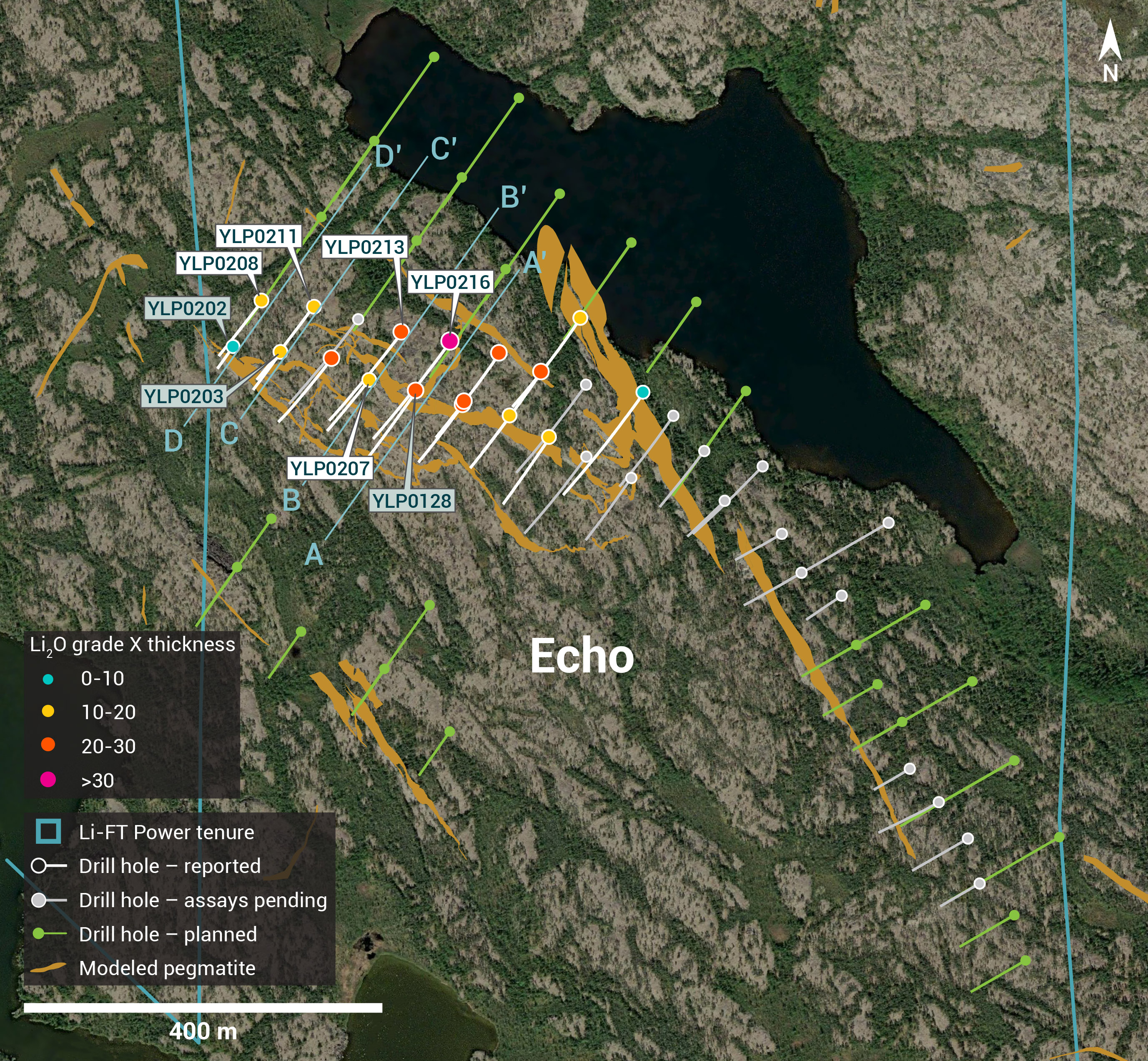
Figure 2 – Plan view showing the surface expression of the Echo pegmatite with diamond drill holes reported in this press release.
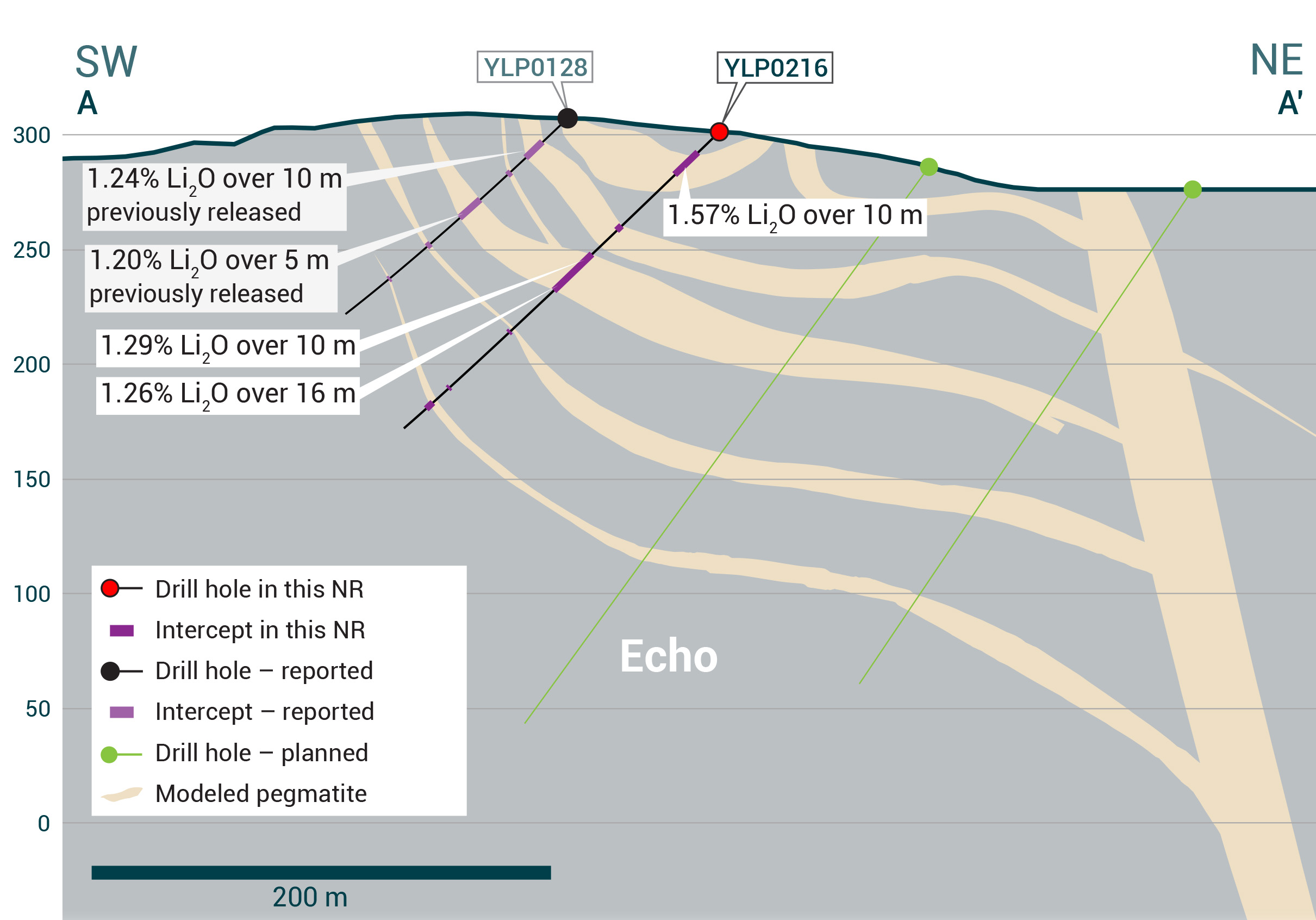
Figure 3 – Cross-section illustrating YLP-0216 with results as shown in the Echo pegmatite dyke with a 16 m interval of
YLP-0207 tested the Echo splay on a section 50 m northwest of YLP-0216, approximately 450 m northwest of the Echo feeder, 200 m from its northwestern mapped extent, 25-50 m below the surface, and 100 m up-dip from YLP-0213 (see below). Drilling intersected a 65 m wide interval with 25 m of pegmatite spread over three dykes that are between 6-12 m wide. Assays returned composites of
YLP-0213 tested the same section as YLP-207 but with intersections targeted 50 m further downdip to 75-100 m below the surface. Drilling intersected two dyke corridors separated by 55 m of country rock. The upper corridor is 66 m wide with 30 m of pegmatite spread over a 16 m wide dyke and five subsidiary dykes between 1-6 m in width. The lower corridor comprises a single dyke that is 23 m wide. Assays returned
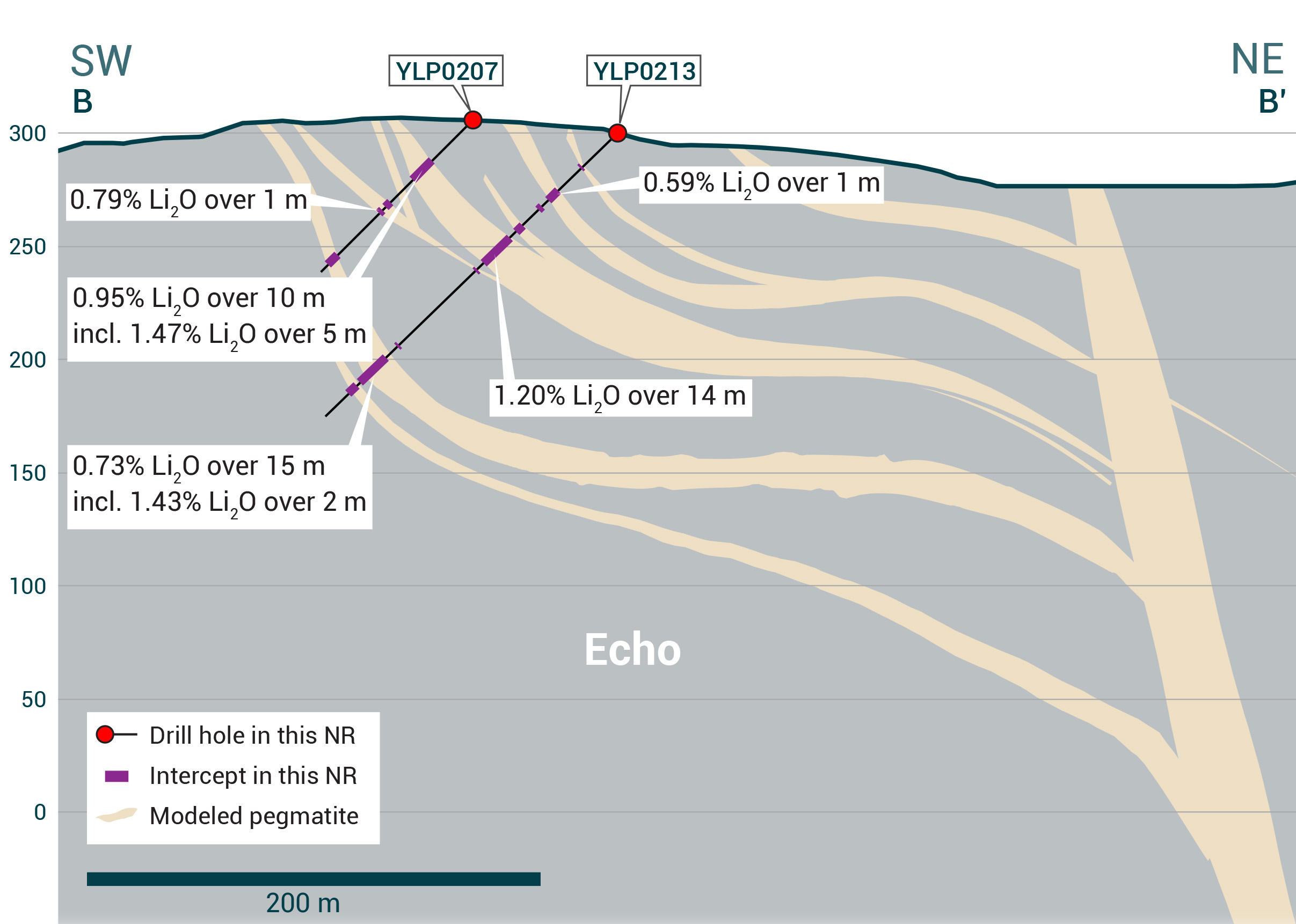
Figure 4 – Cross-section illustrating YLP-0213 with results as shown in the Echo pegmatite dyke with a 14 m interval of
YLP-0211 was collared 100 m northwest of YLP-0213 to test the Echo splay approximately 550 m from the feeder dyke, 100 m from its northwest extent, 50-100 m below the surface, and 50 m downdip of YLP-0203 (
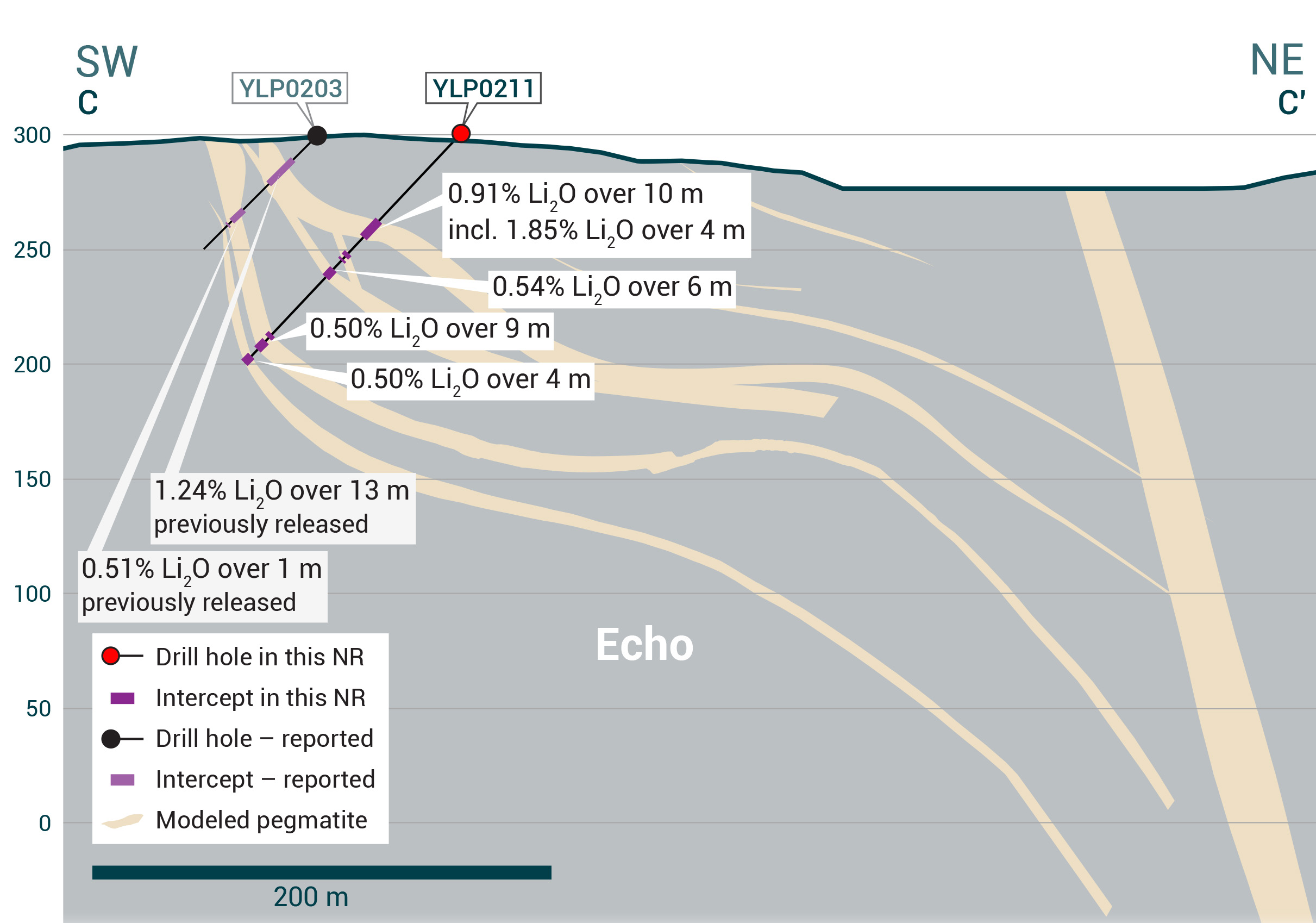
Figure 5: – Cross-section illustrating YLP-0208 with results as shown in the Echo pegmatite dyke with a 10 m interval of
YLP-0208 tested the tip of the Echo splay just 50 m from its northwest mapped extent, 600 m from the feeder dyke, 50-100 m below the surface, and 50 m downdip of YLP-0202 (
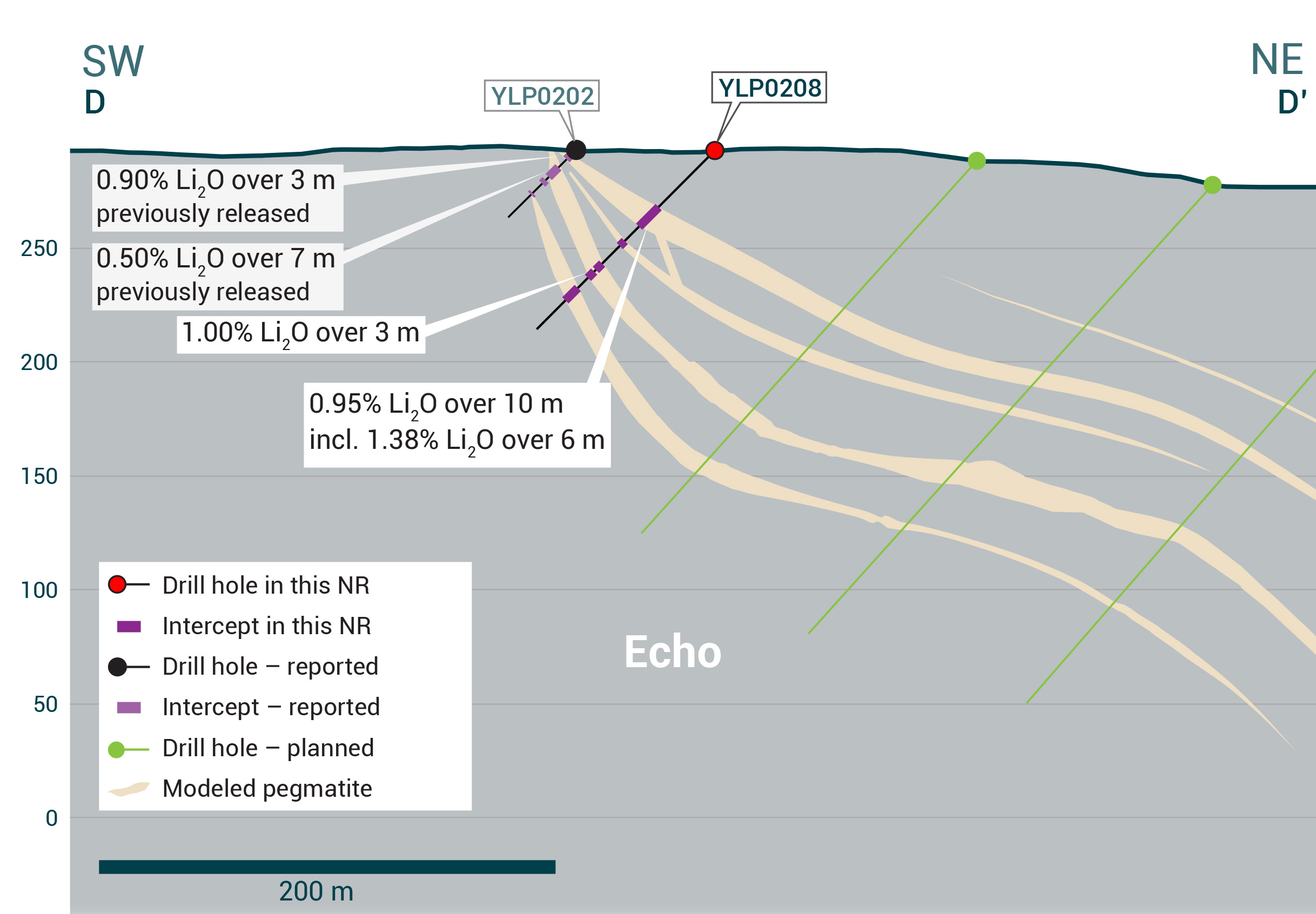
Figure 6: – Cross-section illustrating YLP-0211 with results as shown in the Echo pegmatite dyke with a 10 m interval of
Fi Main Pegmatite
The Fi Main pegmatite is located 250 m to the northeast of the Fi-SW pegmatite complex and crops out over at least 1.5 km of strike length. The structure dips between 70°-85° to the west-northwest and consists of two or more dykes that appear to coalesce in the central part of the complex.
YLP-0190 tested the Fi Main complex approximately 200 m north of the historically mapped northern end extent of the complex and 400 m north of the 2nd most northerly hole (YLP-0024) that returned
Fi Boye Pegmatite
The Fi Boye pegmatite comprises a corridor of mostly north-south striking, steeply east-dipping, dykes that run parallel to, and lie 500-700 m west of, the Fi Main complex. The Fi Boye corridor has at least 1.7 km of striking length, contains between 1-5 dykes, and ranges from approximately 10-200 m in width. Only two holes were drilled on this dyke in 2023, one of which is reported below.
YLP-0186 was drilled to test the Fi Boye dyke approximately 500 m from its northern mapped extent and 100 m beneath the surface. Drilling intersected a 25 m wide corridor with 21 m of pegmatite that returned negligible assay results (Table 1 & 2, Figure 7).
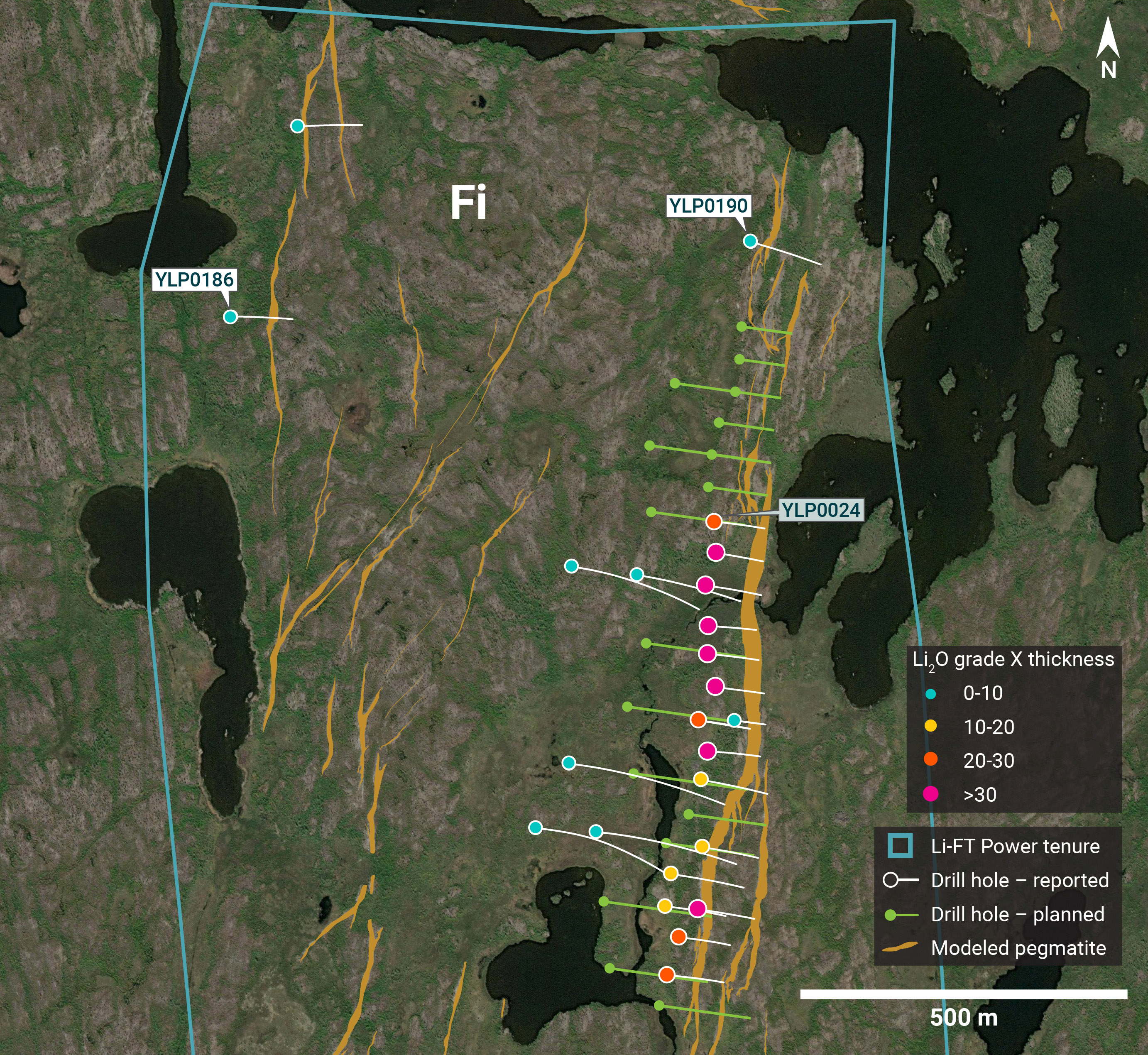
Figure 7 – Plan view showing the surface expression of the Fi Main and Fi Boye pegmatites with diamond drill holes reported in this press release.
Fi Southwest Pegmatite
The Fi SW dyke strikes over at least 1.1 km on surface with an average outcropping width of approximately 20 m. The dyke dips between 60°- 80° to the east-southeast and trends towards the north-northeast. Drilling of Fi SW show that it ranges from a single 20-40 m wide dyke to 2-3 dykes of similar cumulative width within a 50-70 m wide corridor.
YLP-0187 tested the Fi SW pegmatite approximately 150 m from its northern mapped extent and 250 m vertically below the surface, as well as 50 m, 125 m, and 200 m downdip of, respectively, previously released intersections that ranged between 1.2
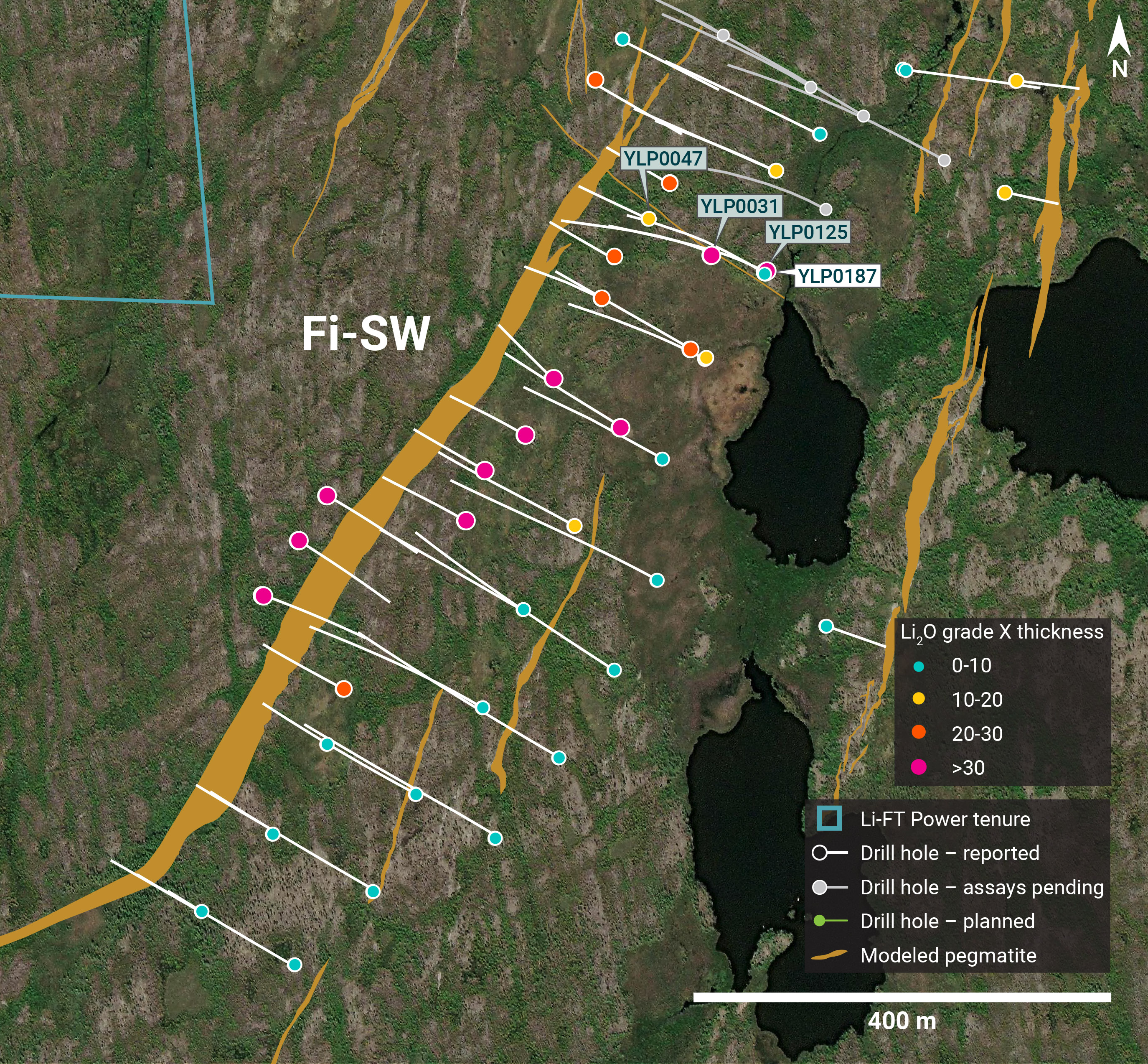
Figure 8 – Plan view showing the surface expression of the Fi Southwest pegmatite with diamond drill holes reported in this press release.
Table 1 – Assay highlights for drill holes reported in this press release.
| Hole No. | From (m) | To (m) | Interval (m) | Li2O% | Dyke |
| YLP-0186 | No significant results | Fi Boye | |||
| YLP-0187 | No significant results | Fi SW | |||
| YLP-0190 | No significant results | Fi Main | |||
| YLP-0207 | 27 | 37 | 10 | 0.95 | Echo |
| inc | 30 | 35 | 5 | 1.47 | |
| and | 52 | 53 | 1 | 0.79 | |
| YLP-0208 | 37 | 47 | 10 | 0.95 | Echo |
| inc | 38 | 44 | 6 | 1.38 | |
| and | 86 | 89 | 3 | 1.00 | |
| YLP-0211 | 50 | 60 | 10 | 0.91 | Echo |
| inc | 53 | 57 | 4 | 1.85 | |
| and | 79 | 85 | 6 | 0.54 | |
| and | 118 | 127 | 9 | 0.50 | |
| and | 131 | 135 | 4 | 0.50 | |
| YLP-0213 | 37 | 38 | 1 | 0.59 | Echo |
| and | 68 | 82 | 14 | 1.20 | |
| and | 149 | 164 | 15 | 0.73 | |
| inc | 162 | 164 | 2 | 1.43 | |
| YLP-0216 | 15 | 25 | 10 | 1.57 | Echo |
| and | 62 | 72 | 10 | 1.29 | |
| and | 77 | 93 | 16 | 1.26 | |
General Statements
All eight holes described in this news release were drilled broadly perpendicular to the dyke orientation so that the true thickness of reported intercepts will range somewhere between 65
Mineralogical characterization for the YLP- pegmatites is in progress through hyperspectral core scanning and X-ray diffraction work. Visual core logging indicates that the predominant host mineral is spodumene.
Table 2 - Drill collars table of reported drill holes in this press release
| Drill Hole | NAD83 | Easting | Northing | Elevation (m) | Azimuth (°) | Dip (°) | Depth (m) | Dyke |
| YLP-0186 | Zone 12 | 371,056 | 6,942,338 | 253 | 93 | 46 | 138 | Fi Boye |
| YLP-0187 | Zone 12 | 371,554 | 6,940,936 | 251 | 302 | 70 | 396 | Fi SW |
| YLP-0190 | Zone 12 | 371,850 | 6,942,452 | 255 | 108 | 45 | 159 | Fi Main |
| YLP-0207 | Zone 12 | 439,057 | 6,922,657 | 307 | 215 | 45 | 105 | Echo |
| YLP-0208 | Zone 12 | 438,937 | 6,922,745 | 295 | 215 | 45 | 111 | Echo |
| YLP-0211 | Zone 12 | 438,994 | 6,922,739 | 301 | 215 | 48 | 150 | Echo |
| YLP-0213 | Zone 12 | 439,094 | 6,922,711 | 304 | 215 | 45 | 180 | Echo |
| YLP-0216 | Zone 12 | 439,146 | 6,922,698 | 303 | 215 | 45 | 189 | Echo |
QA/QC & Core Sampling Protocols
All drill core samples were collected under the supervision of LIFT employees and contractors. Drill core was transported from the drill platform to the core processing facility where it was logged, photographed, and split by diamond saw prior to being sampled. Samples were then bagged, and blanks and certified reference materials were inserted at regular intervals. Field duplicates consisting of quarter-cut core samples were also included in the sample runs. Groups of samples were placed in large bags, sealed with numbered tags in order to maintain a chain-of-custody, and transported from LIFT’s core logging facility to ALS Labs (“ALS”) laboratory in Yellowknife, Northwest Territories.
Sample preparation and analytical work for this drill program were carried out by ALS. Samples were prepared for analysis according to ALS method CRU31: individual samples were crushed to
Qualified Person
The disclosure in this news release of scientific and technical information regarding LIFT’s mineral properties has been reviewed and approved by Ron Voordouw, Ph.D., P.Geo., Partner, Director Geoscience, Equity Exploration Consultants Ltd., and a Qualified Person as defined by National Instrument 43-101 Standards of Disclosure for Mineral Projects (NI 43-101) and member in good standing with the Northwest Territories and Nunavut Association of Professional Engineers and Geoscientists (NAPEG) (Geologist Registration number: L5245).
About LIFT
LIFT is a mineral exploration company engaged in the acquisition, exploration, and development of lithium pegmatite projects located in Canada. The Company’s flagship project is the Yellowknife Lithium Project located in Northwest Territories, Canada. LIFT also holds three early-stage exploration properties in Quebec, Canada with excellent potential for the discovery of buried lithium pegmatites, as well as the Cali Project in Northwest Territories within the Little Nahanni Pegmatite Group.
| For further information, please contact: | ||
| Francis MacDonald Chief Executive Officer Tel: + 1.604.609.6185 Email: info@li-ft.com Website: www.li-ft.com | Daniel Gordon Investor Relations Tel: +1.604.609.6185 Email: investors@li-ft.com | |
Cautionary Statement Regarding Forward-Looking Information
Certain statements included in this press release constitute forward-looking information or statements (collectively, “forward-looking statements”), including those identified by the expressions “anticipate”, “believe”, “plan”, “estimate”, “expect”, “intend”, “may”, “should” and similar expressions to the extent they relate to the Company or its management. The forward-looking statements are not historical facts but reflect current expectations regarding future results or events. This press release contains forward looking statements. These forward-looking statements and information reflect management's current beliefs and are based on assumptions made by and information currently available to the company with respect to the matter described in this new release.
Forward-looking statements involve risks and uncertainties, which are based on current expectations as of the date of this release and subject to known and unknown risks and uncertainties that could cause actual results to differ materially from those expressed or implied by such statements. Additional information about these assumptions and risks and uncertainties is contained under "Risk Factors and Uncertainties" in the Company's latest annual information form filed on March 30, 2023, which is available under the Company's SEDAR+ profile at www.sedarplus.ca, and in other filings that the Company has made and may make with applicable securities authorities in the future. Forward-looking statements contained herein are made only as to the date of this press release and we undertake no obligation to update or revise any forward-looking statements whether as a result of new information, future events or otherwise, except as required by law. We caution investors not to place considerable reliance on the forward-looking statements contained in this press release.
Neither the TSX Venture Exchange nor its Regulation Services Provider (as that term is defined in the policies of the TSX Venture Exchange) accepts responsibility for the adequacy or accuracy of this news release.








